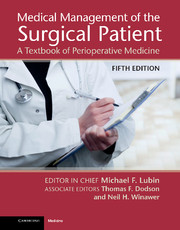Book contents
- Frontmatter
- Dedication
- Contents
- List of Contributors
- Preface
- Introduction
- Part 1 Perioperative Care of the Surgical Patient
- Section 1 General
- Section 2 Cardiology
- Section 3 Hypertension
- Section 4 Pulmonary
- Section 5 Gastroenterology
- Section 6 Hematology
- Section 7 Infectious disease
- Section 8 Renal disease
- Section 9 Endocrinology
- Chapter 29 Diabetes mellitus
- Chapter 30 Disorders of the thyroid
- Chapter 31 Disorders of the adrenal cortex
- Chapter 32 Disorders of calcium metabolism
- Chapter 33 Pheochromocytoma
- Section 10 Rheumatology
- Section 11 Neurology
- Section 12 Surgery in the Elderly
- Section 13 Obesity
- Section 14 Transplantation
- Section 15 Psychiatric Disorders
- Section 16 Peripartum Patients
- Part 2 Surgical Procedures and their Complications
- Index
- References
Chapter 30 - Disorders of the thyroid
from Section 9 - Endocrinology
Published online by Cambridge University Press: 05 September 2013
- Frontmatter
- Dedication
- Contents
- List of Contributors
- Preface
- Introduction
- Part 1 Perioperative Care of the Surgical Patient
- Section 1 General
- Section 2 Cardiology
- Section 3 Hypertension
- Section 4 Pulmonary
- Section 5 Gastroenterology
- Section 6 Hematology
- Section 7 Infectious disease
- Section 8 Renal disease
- Section 9 Endocrinology
- Chapter 29 Diabetes mellitus
- Chapter 30 Disorders of the thyroid
- Chapter 31 Disorders of the adrenal cortex
- Chapter 32 Disorders of calcium metabolism
- Chapter 33 Pheochromocytoma
- Section 10 Rheumatology
- Section 11 Neurology
- Section 12 Surgery in the Elderly
- Section 13 Obesity
- Section 14 Transplantation
- Section 15 Psychiatric Disorders
- Section 16 Peripartum Patients
- Part 2 Surgical Procedures and their Complications
- Index
- References
Summary
Because thyroid hormones exert regulatory effects on multiple organ systems, thyroid function should be aggressively evaluated and abnormal function treated in patients who require surgery. Thyroid hormones also significantly affect the metabolism of many drugs, and dose adjustments may be required when function is abnormal. Medical consultants performing preoperative evaluations should include clinical assessments of thyroid function and perform confirmatory tests when indicated.
The adult thyroid gland weighs 15–20 g, typically consists of two lobes connected by an isthmus, and is located just below the cricoid cartilage. A remnant of the thyroglossal duct, the pyramidal lobe may be noted arising superiorly from the isthmus or medial side of a lobe. Enlargement of the pyramidal lobe indicates a diffuse thyroidal abnormality. The thyroid gland consists of follicles, which are spheres lined by a single layer of cuboidal cells and are filled with a colloid that is composed primarily of thyroglobulin. A rich capillary network surrounds the follicles, explaining why a bruit is sometimes heard over hyperactive, enlarged thyroid glands. Scattered throughout the thyroid are calcitonin-secreting perifollicular cells. Hyperplasic or malignant transformation of these cells does not result in abnormalities of thyroid function [1–3].
- Type
- Chapter
- Information
- Medical Management of the Surgical PatientA Textbook of Perioperative Medicine, pp. 350 - 357Publisher: Cambridge University PressPrint publication year: 2013

